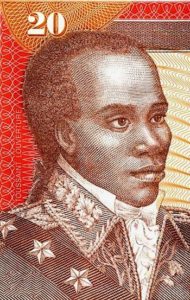
Toussaint Louverture
(on Hatian banknote)
*Toussaint Louverture was born on this date in 1743. He was a Black Haitian general and abolitionist.
François-Dominique Toussaint Louverture is thought to have been born on the plantation of Bréda at Haut de Cap in Saint-Domingue. Louverture's parents are not known. John Beard's biography of Louverture claims that family traditions name his grandfather as from Southern Benin. Louverture was the eldest of several children. In childhood, he earned the nickname Fatras-Bâton, suggesting he was small and weak, though he was to become known for his stamina and riding prowess.
Louverture is believed to have been well educated by his godfather Pierre Baptiste, a free person of color who lived and worked on the Bréda plantation. Historians have speculated as to Louverture's intellectual background. His extant letters demonstrate a command of French in addition to Creole, and he reveals familiarity with Epictetus, the Stoic philosopher who had lived as a slave.
His public speeches and his life's work, according to his biographers, show familiarity with Machiavelli. Some cite Abbé Raynal, who wrote against slavery, as a possible influence: The wording of the proclamation issued by Louverture on August 29, 1793, which may have been the first time he publicly used the name "Louverture", refers to an anti-slavery passage in Abbé Raynal's "A Philosophical and Political History of the Settlements and Trade of the Europeans in the East and West Indies." He may also have received some education from Jesuit missionaries. His medical knowledge is attributed to familiarity with African or Creole herbal-medical techniques and techniques commonly found in Jesuit-administered hospitals.
Throughout his military and political career, he used secretaries to prepare most correspondence. A few surviving documents in his own hand confirm that he could write, although his spelling in the French language was "strictly phonetic." In 1782, Louverture married Suzanne Simone Baptiste, who is thought to have been his cousin or godfather's daughter. Toward the end of his life, he said he had fathered 16 children with multiple women, of whom 11 had predeceased him. The two sons born of his marriage with Suzanne were Isaac and Saint-Jean.
Jean-Jacques Dessalines was at least partially responsible for Louverture's arrest, as asserted by several authors, including Louverture's son Isaac. For this action, Dessalines and his spouse received gifts from French general Jean Baptiste Brunet, who was ordered to conduct the arrest. One version said that Brunet pretended that he planned to settle in Saint-Domingue and was asking Louverture's advice about plantation management. Louverture's memoirs show Louverture had a letter in which Brunet described himself as a "sincere friend" to take with him to France. Embarrassed about his trickery, Brunet absented himself during the arrest.
Brunet deported Louverture and his aides to France on the frigate Créole. The ships reached France on July 2, 1802, and on August 25 of that year, Louverture was sent to the jail in Fort-de-Joux in Doubs. While in prison, Toussaint Louverture died on April 7, 1803. He said: “In overthrowing me, you have cut down in Saint Domingue only the trunk of the tree of liberty; it will spring up again from the roots, for they are numerous, and they are deep.”
Louverture was a general and the best-known leader of the Haitian Revolution. He was a leader of the growing resistance. His military and political acumen saved the gains of the first Black insurrection in 1791. He first fought for the Spanish against the French; then for France against Spain and Great Britain; and finally, he fought on behalf of Saint-Domingue in the era of Napoleonic France. He helped transform the slave insurgency into a revolutionary movement. Although Louverture did not sever ties with France in 1800, he created a de facto autonomous colony. The colony's constitution proclaimed him governor for life, even against Napoleon Bonaparte's wishes.
He died betrayed before the armed conflict's final and most violent stage. However, his achievements set the grounds for the black army's absolute victory and for Jean-Jacques Dessalines to declare the sovereign state of Haiti in January 1804. Louverture's prominent role in the Haitian success over colonialism and slavery earned him the admiration of friends and detractors.
